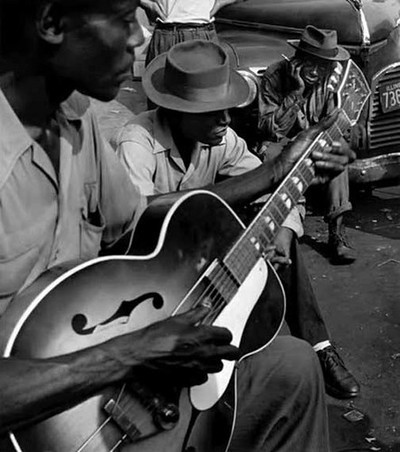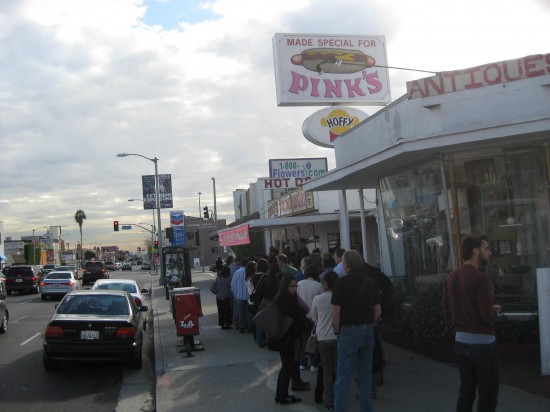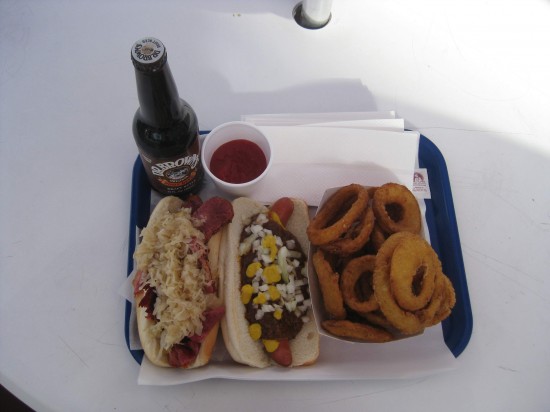Pigmeat is What I Crave by Glenn Taylor
The title comes from an old blues song by Bo Carter in which he sings, “When I die you need not bury me at’all/ hang me up against that pigmeats wall/ and you can give me pigmeat.” Mr. Carter’s song seemed a good place to begin in considering my pleasures of January, perhaps because two things initially came to mind. First, my unending search for the most delicious hot dog in the world, and second, my unending search for the most pure blues music in the world. The following digression is the result of January’s search.
I had to go Los Angeles at the beginning of the month. Intellectual pursuits, you might say, brought me there. That’s a story for another time. Foremost in my plans for L.A. was a trip to Pink’s Hot Dog Stand, in business since 1929, and a legendary eatery frequented by hungry Angelinos from all walks of life. I was staying downtown, so I hailed a cab to West Hollywood. “Pink’s Hot Dogs on La Brea,” I told the cab driver. He answered, “We take freeway — it’s faster,” in an accent I guessed to be Russian. We got on the 10, the Santa Monica Freeway, and it soon occurred to me that we were going entirely too fast, hugging the wall in the carpool lane, passing everyone in sight. Out of the corner of my eye, I looked at the speedometer. We were going 95 miles an hour. I closed my eyes and waited. Eventually we exited the freeway, and at the corner of Redondo and San Vicente, while stopped at a red light, I noticed a man standing on the curb just outside the cab. He wore all black. Shiny material, complete with cape and hood that encircled his alien mask in such a way as to make him intimidating. I didn’t know whether to be amused or genuinely frightened, but I refrained from following my gut instinct, which was to take his picture through the window glass. He’d attached silver and red buttons, the size of measuring cups, to his shirtfront, and he began pressing them in an order which no doubt had serious meaning to him. The cab driver lazily looked in the man’s direction, shook his head, and said, “Velcome to Los Angeles.”
The cab fare to Pink’s was almost forty bucks. I was thinking, these better be some pretty good fucking hot dogs. Judging from the line at 2:00 on a Thursday, they had to be. Waiting in line for twenty minutes gave me a chance to really study the menu. I decided to go with the original chili dog (a safe bet), along with a specialty, the pastrami rueben dog (a gamble). Side of onion rings. Root beer. The results? Yes, the franks themselves were encased in a natural skin and cooked just right, so they had that pop when my teeth broke through. Much like the texture of the excellent dogs at Gray’s Papaya in New York. The toppings on the chili dog were good, but not great. Better than The Choo Choo in Greensboro, North Carolina, for instance, but slightly below such chili toppings at a places like The Varsity in Atlanta, or Hillbilly Hot Dogs in my hometown of Huntington, West Virginia. As for the pastrami rueben dog? It was too much. I realized that I may love pigmeat, and cowmeat too for that matter, but I don’t need pastrami piled on top of my dog. It’s just plain wrong, like the turduckhen.
 Lightin’ Hopkins. Photographer unknown.
Lightin’ Hopkins. Photographer unknown.
My wife is a vegetarian, for Christ’s sake. What drives me onward on such a gastronomical quest? The intestinal fallout alone from such hot dog eating is enough to give even the most adventuresome traveler the gut blues. And so we arrive again at the blues. The pigmeat blues if you will, but Bo Carter is not on my January list of pleasures. I discovered him long ago, early in my quest, before I had encountered music that can “crush the heart with a living memory,” to quote Harry Crews. There are two songs I’ve discovered in January that I’d like to mention here. The first is by Lightnin Hopkins, and it’s called “Buddy Brown’s Blues.” I love this song not only because Hopkins had a voice like barbed-wire butter and could pick the guitar natural as a baby does his nose, but also because it contains the kind of language and insight that every fiction writer ought to be in touch with. Consider this nugget of plain, true wisdom: “When a man get hairy/ you know he need a shave . . . but when a woman get musty/ you know she needs to bathe.” Ain’t it the truth. The other song I’ve had the pleasure of discovering this month is a version of “Dark Was the Night, Cold was the Ground” that I’d never heard before. Of course, Blind Willie Johnson did the song as good as any, and I’d thought heretofore that Corey Harris had taken it to a place that would not be surpassed, but now I’ve heard the rendition of a guitar man named Catfish Keith. Listen to it on good headphones. Close your eyes. It’ll take you somewhere. It’ll take you somewhere that people on planes to Los Angeles have forgotten about. Because I’ll tell you what — I listened to Catfish Keith’s “Dark Was the Night, Cold Was the Ground” at 36,000 feet, crossing over the middle of the country at night, chasing the setting sun in the West, and I took pictures of what I saw out my plane window. I nudged the woman next to me to take a look, to see the absolute beauty, the mind-boggling wonder of being above the clouds, of riding in a steel contraption through the heavens. I knew that if my sons were with me, their eyes would widen in pure joy, but the woman next to me just smiled politely and went back to her Kindle. Next to her, another woman pecked at her Blackberry, and behind her and in front of her, everyone else did the same. None of them gazed in wonder at the impossible beauty outside their windows. They have the worst kind of the blues, and they don’t even know it.

Here in Chicago, the night is dark and the ground is cold, and like everywhere else, people stare at little metal boxes in their hands that will never bring them what they’re looking for. But I don’t sweat it. I’ll just keep chasing pigmeat to keep my belly full.
Glenn Taylor is the author of two novels, ‘The Ballad of Trenchmouth Taggart’ and ‘The Marrowbone Marble Company’ (published March 3). Essential reading for lovers of John Steinbeck, Will Oldham, Cormac McCarthy, Matewan and the Blues.

